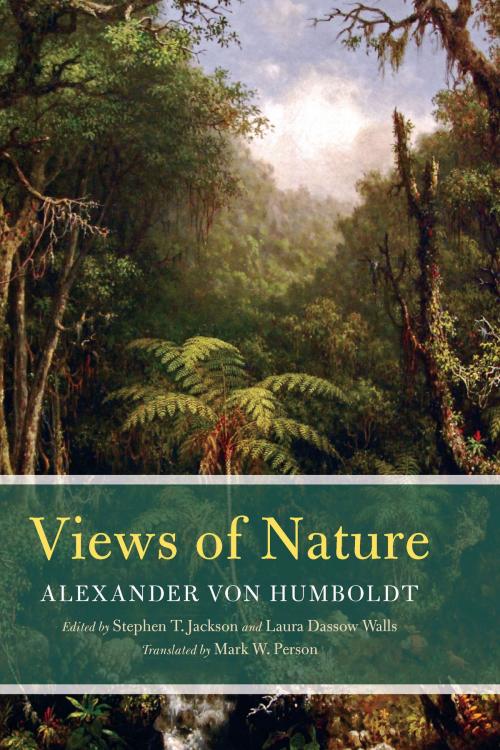| Author: | Alexander von Humboldt | ISBN: | 9780226923192 |
| Publisher: | University of Chicago Press | Publication: | July 17, 2014 |
| Imprint: | University of Chicago Press | Language: | English |
| Author: | Alexander von Humboldt |
| ISBN: | 9780226923192 |
| Publisher: | University of Chicago Press |
| Publication: | July 17, 2014 |
| Imprint: | University of Chicago Press |
| Language: | English |
While the influence of Alexander von Humboldt (1769–1859) looms large over the natural sciences, his legacy reaches far beyond the field notebooks of naturalists. Humboldt’s 1799–1804 research expedition to Central and South America with botanist Aimé Bonpland not only set the course for the great scientific surveys of the nineteenth century, but also served as the raw material for his many volumes—works of both scientific rigor and aesthetic beauty that inspired such essayists and artists as Emerson, Goethe, Thoreau, Poe, and Frederic Edwin Church.
Views of Nature, or Ansichten der Natur, was Humboldt’s best-known and most influential work—and his personal favorite. While the essays that comprise it are themselves remarkable as innovative, early pieces of nature writing—they were cited by Thoreau as a model for his own work—the book’s extensive endnotes incorporate some of Humboldt’s most beautiful prose and mature thinking on vegetation structure, its origins in climate patterns, and its implications for the arts. Written for both a literary and a scientific audience, Views of Nature was translated into English (twice), Spanish, and French in the nineteenth century, and it was read widely in Europe and the Americas. But in contrast to many of Humboldt’s more technical works, Views of Nature has been unavailable in English for more than one hundred years. Largely neglected in the United States during the twentieth century, Humboldt’s contributions to the humanities and the sciences are now undergoing a revival to which this new translation will be a critical contribution.
While the influence of Alexander von Humboldt (1769–1859) looms large over the natural sciences, his legacy reaches far beyond the field notebooks of naturalists. Humboldt’s 1799–1804 research expedition to Central and South America with botanist Aimé Bonpland not only set the course for the great scientific surveys of the nineteenth century, but also served as the raw material for his many volumes—works of both scientific rigor and aesthetic beauty that inspired such essayists and artists as Emerson, Goethe, Thoreau, Poe, and Frederic Edwin Church.
Views of Nature, or Ansichten der Natur, was Humboldt’s best-known and most influential work—and his personal favorite. While the essays that comprise it are themselves remarkable as innovative, early pieces of nature writing—they were cited by Thoreau as a model for his own work—the book’s extensive endnotes incorporate some of Humboldt’s most beautiful prose and mature thinking on vegetation structure, its origins in climate patterns, and its implications for the arts. Written for both a literary and a scientific audience, Views of Nature was translated into English (twice), Spanish, and French in the nineteenth century, and it was read widely in Europe and the Americas. But in contrast to many of Humboldt’s more technical works, Views of Nature has been unavailable in English for more than one hundred years. Largely neglected in the United States during the twentieth century, Humboldt’s contributions to the humanities and the sciences are now undergoing a revival to which this new translation will be a critical contribution.















